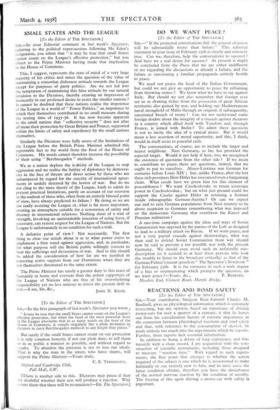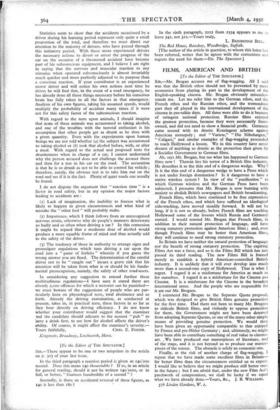REACTIONS AND ROAD SAFETY
[To the Editor of THE SPECTATOR.] SIR,—Your contributor, Surgeon Rear-Admiral Charles M. Beadnell, gives us physiological information which is extremely interesting, but my opinion, based on experience of driving motor-cars for over a quarter of a century, is that he leaves out from his consideration factors of extreme importance in the connexion between physiological reactions and road safety and that, with reference to the consumption of alcohol, he reads entirely too much into the experiments which he reports. Further, those reports lack essential information.
In addition to being a driver of long experience, and for- tunately with a clean record, I am acquainted with the con- struction of scientific instruments, including those designed to measure " reaction time." With regard to such experi- ments, the first point that emerges is whether the action required of the subject is one which he is accustomed to make habitually or one entirely new to him, and in most cases the latter condition obtains, therefore you have the disturbance of the normal nervous reaction by the condition of novelty. The bearing of this upon driving a motor-car with safety is important. Statistics seem to show that the accidents occasioned by a driver during his learning period represent only quite a small proportion of the total, and therefore we must direct our attention to the majority of drivers, who have passed through this initiatory period. With those more experienced driyers the necessary actions to divert or arrest the progress of the car on the occasion of a threatened accident have become part of his subconscious equipment, and I believe I am right in saying that the nervous and muscular reaction to any stimulus when operated subconsciously is almost invariably much quicker and more perfectly adjusted to its purpose than a conscious reaction. If your contributor is an experienced motor driver and will notice his own actions next time he drives he will find that, in the event of a road emergency, he has already done all those things necessary before his conscious brain has fully taken in all the factors in that emergency. Analysis of his own figures, taking his assumed speeds, would multiply the probability of accident many times if it were not for this safety factor of the subconscious reaction.
With regard to the tests upon animals, I should imagine that none of these animals was accustomed to taking alcohol, and one of the troubles with the teetotal enthusiast is his assumption that other people get as drunk as he does with a given quantity. Even with the experiments upon human beings we are not told whether (a) the subject was accustomed to taking alcohol or (b) took that alcohol before, with, or after a meal. With regard to the actual and proposed tests for drunkenness when in charge of a car, I cannot understand why the person accused does not challenge the accuser there and then for a test in his car on the road. The accusation is that he is so drunk as not to be able to control his vehicle ; therefore, surely, the obvious test is to take him out on the road and see if it is the fact. Plenty of quiet roads can usually be found.
I do not dispute the argument that " reaction time " is a factor in road safety, but in my opinion the major factors leading to accidents are : (I) Lack of imagination, the inability to foresee what is likely to happen in given circumstances and what kind of mistake the " other fool " will probably make.
(2) Impatience, which I think follows from an unrecognised nervous strain, otherwise why do people's manners deteriorate so badly and so often when driving a car ? In this connexion it might be argued that a moderate dose of alcohol would produce a more equable frame of mind and thus actually add to the safety of the driver.
(3) The tendency of those in authority to arrange signs and promulgate regulations which turn driving a car upon the road into a " game of forfeits " wherein if you guess the wrong answer you are fined. The determination of the careful driver not to be " caught out " incurs a grave risk that his attention will be taken from what is or should be his funda- mental preoccupation, namely, the safety of other road-users.
In considering any suggestion to extend further these multitudinous regulations—I have seen it stated there are already 2,000 offences for which a motorist can be punished— we must beware of the suggestions of people who are par- ticularly keen on physiological tests, total abstinence and so forth. Already the driving examination, as conducted at present, takes in, in practical tests, these factors in so far as they bear directly on driving efficiency. I do not know whether your contributor would suggest that the examiner ind the candidate should adjourn to the nearest " pub " to have a drink first, to see how far alcohol affects the driver's ability. Of course, it might affect the examiner's severity.—
Yours faithfully, CHAS. E. FOSTER.
Kingsweir, Broadway, Letchworth, Herts.







































































 Previous page
Previous page